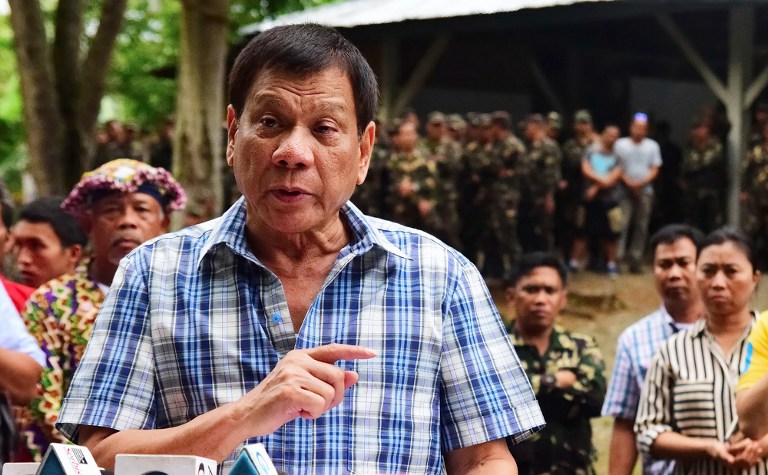
Philippine president Rodrigo Duterte on July 30 withdrew a unilateral ceasefire with communist rebels after his ultimatum for the group to reciprocate lapsed. “AFP PHOTO / RENE LUMAWAG / PRESIDENTIAL PHOTOGRAPHERS DIVISION”
MANILA, Philippines (AFP) — Philippine president Rodrigo Duterte on Saturday withdrew a unilateral ceasefire with communist rebels after his ultimatum for the group to reciprocate lapsed.
Duterte had announced the truce on Monday to help end one of Asia’s longest insurgencies which claimed tens of thousands of lives since the 1960s.
But the ceasefire was short-lived after communist rebels in the southern province of Davao del Norte killed Wednesday one government militia member and wounded four others.
Duterte on Friday gave the communists an ultimatum to explain the incident and to reciprocate the government ceasefire by Saturday afternoon but the deadline passed without a truce declaration from the rebels.
“I am hereby ordering the immediate lifting of the ceasefire,” Duterte said.
“I am ordering all security forces to be on high alert and continue to discharge their normal functions to neutralise all threats to national security.”
Duterte, who assumed office on June 30 after a landslide election win, has said it was his “dream” to forge peace with communist rebels but asked them to show “good faith”.
Exiled rebel leader Jose Maria Sison, Duterte’s university professor, said the communists were set to declare a ceasefire Saturday evening but the president had already called off the truce before an announcement could be made.
“Volatility, lack of prudence in something as sensitive and delicate as peace negotiations between two armed fighting sides, it’s hard to agree with people who are quick to judgment,” Sison told ABS-CBN television.
“The revolutionary movement is treated as if it’s a servant of the new boss. That cannot be.”
A regional spokesman for the communists’ armed wing, the New People’s Army, also said Saturday that the government ceasefire in the southern region of Mindanao was “spurious” because security forces were still conducting combat operations.
The New People’s Army is believed to have fewer than 4,000 gunmen, down from a peak of 26,000 in the 1980s, according to the military.
But it retains support among the deeply poor in rural areas, and its forces regularly kill police or troops while extorting money from local businesses.
Despite the withdrawal of the ceasefire, both sides said they were still keen on pushing through with the resumption of peace talks set on August 20.
Sison said the communists were willing to address “any miscommunication” and “improve the situation”.
The two sides held in June preliminary talks in Norway, whose government has acted as a go-between in the negotiations.
ajm/tm
© 1994-2016 Agence France-Presse







